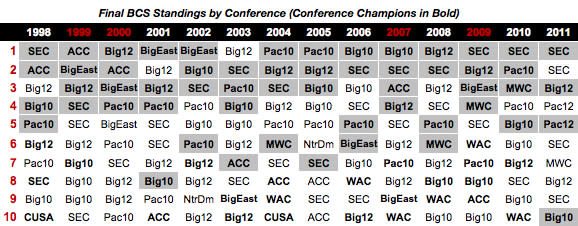A Humble Suggestion: So, you’re putting together a 4-team playoff…

Like it or not, dialogue over the viability of a playoff in major college football has finally bypassed the if phase, and it's beginning to look like an answer for what may not be too far off: Now that the Big Ten is warming up to the idea, some variety of four-team playoff has moved to the front burner and could be in the works by the start of next season. Once it's decided, we know the when: 2014, the first year under the next four-year BCS contract.
The only lingering question now — and the one most likely to throw a wrench into the entire operation — is how. If there is a mandate for a four-team bracket, exactly what is going to look like? I submit a few ideas for consideration:
• Keep some version of the BCS standings. That's probably worth a spit-take for regular readers, who are used to me trashing the basic premise of the BCS at every available opportunity. And the idea of plucking just two teams from a handful of deserving candidates remains fundamentally flawed; the idea of plucking just four teams only slightly less so.
But the method for plucking those teams — a somewhat byzantine combination of human and computer polls — works well enough in theory. In practice, a few of the human voters and at least one computer are probably ripe for the chopping block. But the underlying format for assessing teams with vastly different strengths of schedules is sound enough.

•Keep the bowls. And keep them on New Year's Day.
The Big Ten's plan reportedly calls for semifinal games to be held on campus sites, presumably to offset decades of bowling in Florida, Texas and California by forcing warm-weather teams to make unprecedented trips northward in the dead of winter. But the Big Ten and Pac-12 also want to keep the Rose Bowl relevant in a playoff system, and the surest way to make sure that happens is to make sure it's part of the playoff: Stage one of the semifinal games on New Year's Day, in the Rose Bowl, every year.
Don't change anything about the Rose Bowl or the pageantry that surrounds it. Keep the "bowl experience" in the week leading up to the game, keep the parade, keep the swag. You're still playing in the Rose Bowl. If necessary, give the Big Ten and Pac-12 preference: If a team from either conference qualifies for the playoff, that team is automatically booked for the Rose Bowl. (If teams from both conferences qualify, the trip to Pasadena will be reserved for the higher seed.)
Stage the other semifinal in one of the other BCS bowls — the Fiesta, Orange or Sugar — on a rotating basis on New Year's night, just as those games have done for decades. Keep the "bowl experience," keep the parades, keep the swag. The heavy-hitting bowl games that rotate out of the playoff picture can continue to operate on exactly the same basis they do now, as glorified exhibitions that bilk fans and universities out of millions. Don't change anything.
• Bid out the championship game on an annual basis. Yeah, it's a little too reminiscent of the Super Bowl, a comparison college football would do best to avoid. But doubling up on one of the traditional bowl sites for the championship game has always been a little redundant, and would be even more so if one of the teams in the championship had just played a semifinal game there a week or two before. Pick a new neutral site every year, a la the Final Four.
Alternate suggestion: Just hold the championship in New Orleans every year. No one will complain.
• Only conference champions make the cut. Ah, this is where I'm going to lose a lot of you, especially after SEC West runner-up Alabama just used its mulligan to "prove" its ultimate superiority over SEC champion LSU in the BCS Championship Game. But with such an exclusive field, there are at least five good reasons to consider eliminating the wild cards:
1. It's the least arbitrary, most intuitive way to select the teams. As the Associated Press' Ralph Russo put it earlier today: You must win THIS to get into THAT. With only four teams in the discussion, a national championship for a team that failed to win its own conference championship is a bizarre concept.
2. It applies to all conferences equally. The proliferation of championship games in the major conferences has leveled the bar for entry, and nicely mirrors the automatic-bid concept in conference basketball tournaments.
3. It offers opportunity to more conferences.
4. It respects the hell out of the regular season.
5. Competitively, it wouldn't look all that different than simply taking the top four teams in the final standings:

The shaded teams, obviously, are the teams that would have comprised a four-team, conference-champions-only field. (In this hypothesis, I decided Notre Dame would have to finish among the top four to qualify, which hasn't happened in the BCS era.) On average, only one top-four team will miss the cut per year for a lower-ranked conference champion, occasionally from within the same conference. (See No. 5 Oregon over No. 4 Stanford last year.) But the final decision is less subjective, and the bar is still high enough to ensure that everyone who does make the cut deserves to be there.
In 14 years, only three teams (Illinois in 2001, Florida State in 2003, Georgia in 2005 and Wisconsin in 2011) would have made a four-team, conference-champions-only field with a final ranking lower than sixth. No team would have made it with more than two losses. And it increases the odds (although it doesn't guarantee) that a deserving team from outside of one of the traditional power conferences — see undefeated Utah in 2004 and 2008 — will get its shot. The gap between the first team in and the last team in will never be so wide that the latter can't close it with a couple top-shelf wins.
• Remember: The perfect is the enemy of the good. At the broadest level, the specifics don't really matter: The important thing is that a playoff is on the table. Any system that could realistically exist will be an improvement on the status quo.
And just as it's about to grow from two teams to four, eventually that system will grow to six teams, then to eight, then to ten or twelve, the priorities and logistics expanding each time. At some point, it will probably be bigger and more inclusive than I'd like, and I'll find myself leading the chorus of complaints about a "hot" team with three or four losses that never deserved to make the cut in the first place. At every point there will be teams on the wrong side of the cutoff that have a legitimate complaint about being left out. That will never change. But whatever the bracket looks like, and whatever the new complaints that come along with it, it's still a step forward from the debacle that's ruled the sport for the last 15 years.
- - -
Matt Hinton is on Facebook and Twitter: Follow him @DrSaturday.

